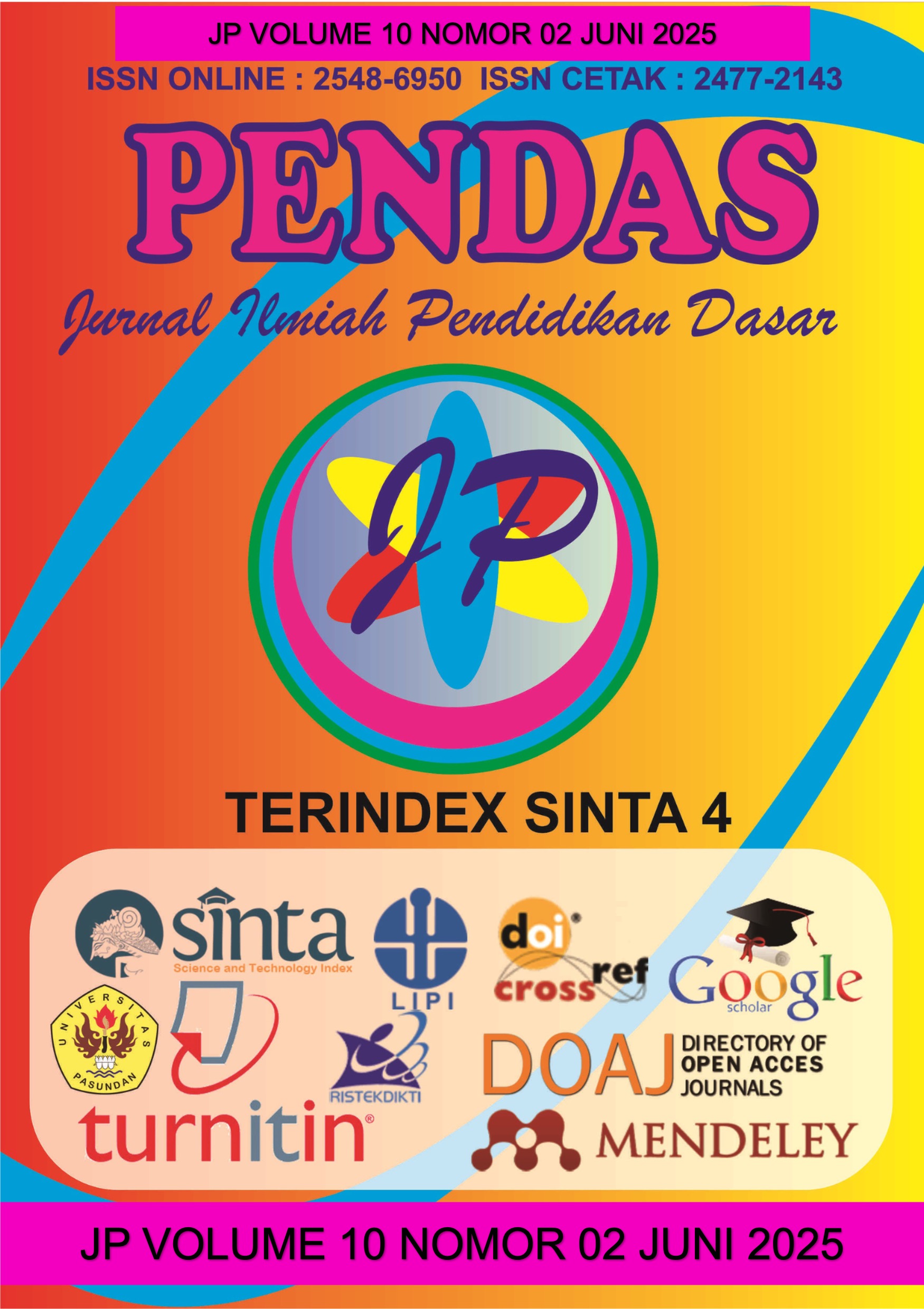INOVASI KURIKULUM SEKOLAH INKLUSI DALAM PENGUATAN LITERASI BACA-TULIS: MEWUJUDKAN AKSES PENDIDIKAN BERKUALITAS YANG SETARA
DOI:
https://doi.org/10.23969/jp.v10i02.24009Keywords:
Curriculum Innovation, Inclusive Education, Reading and Writing Literacy, Elementary SchoolsAbstract
Inclusive education in elementary schools aims to provide equal access for all students, including those with special needs. One of the main challenges in implementing inclusive education is strengthening literacy skills, which are essential for academic success. This study aims to identify and analyze the curriculum innovations implemented in inclusive elementary schools to strengthen literacy skills. A qualitative descriptive approach with a case study design was used in this research. The study was conducted in two inclusive elementary schools in Makassar City that apply the Merdeka Curriculum. The subjects of the study consisted of school principals, classroom teachers, special education teachers (GPK), and both special needs and regular students. Data were collected through observations, interviews, and document analysis. The results showed that curriculum innovations, such as the use of Universal Design for Learning (UDL) principles, project-based learning, and the integration of educational technology, significantly supported the strengthening of literacy skills. Moreover, collaboration among teachers, students, parents, and the community played a key role in creating an inclusive and literate learning environment. This study concludes that responsive curriculum innovations that cater to the individual needs of students are crucial in achieving equitable and inclusive education in elementary schools.
Downloads
References
Booth, T., & Ainscow, M. (2016). The Index for Inclusion: Developing learning and participation in schools (4th ed.). Centre for Studies on Inclusive Education.
CAST. (2018). Universal Design for Learning guidelines version 2.2. CAST. https://www.cast.org/our-work/publications/2018/udl-guidelines-version-22
Hanifa, S., Kusumawati, D., & Rahmawati, D. (2022). Tantangan dan solusi dalam penerapan kurikulum inklusif di sekolah dasar. Jurnal Pendidikan Inklusif, 6(2), 134-146. https://doi.org/10.12345/jpi.2022.062134
Kemendikbud. (2009). Permendikbud No. 70 Tahun 2009 tentang Pendidikan Inklusif. Kementerian Pendidikan dan Kebudayaan.
Kemendikbudristek. (2021). Kurikulum Merdeka: Pedoman implementasi (Edisi 2021). Kementerian Pendidikan, Kebudayaan, Riset, dan Teknologi.
Miles, M. B., Huberman, A. M., & Saldaña, J. (2014). Qualitative data analysis: A methods sourcebook (3rd ed.). SAGE Publications.
Meyer, A., Rose, D. H., & Gordon, D. (2014). Universal design for learning: Theory and practice. CAST Professional Publishing.
Omar, S., & Rashid, F. M. (2022). Implementing Universal Design for Learning (UDL) in inclusive classrooms: A review of current practices and future directions. International Journal of Inclusive Education, 26(7), 745-758. https://doi.org/10.1080/13603116.2020.1784027
Putri, R. N., & Mahfud, M. (2023). Budaya lokal sebagai basis pengembangan kurikulum inklusif di sekolah dasar. Jurnal Pendidikan dan Kebudayaan, 14(1), 65-79.
Rahmah, N., Farida, I., & Alfi, Z. (2023). Pemanfaatan teknologi untuk mendukung literasi di sekolah inklusif. Jurnal Teknologi Pendidikan, 13(2), 115-127. https://doi.org/10.21009/JTP.132.115
Sari, A., & Wijayanti, I. (2023). Tantangan pembelajaran literasi pada anak berkebutuhan khusus di sekolah inklusif. Jurnal Pendidikan Inklusif, 7(1), 45-56. https://doi.org/10.12345/jpi.2023.07145
Sunarto, A., Widodo, A., & Hadi, D. (2022). Pengembangan modul literasi digital untuk anak berkebutuhan khusus. Jurnal Teknologi Pendidikan, 15(3), 210-221. https://doi.org/10.12345/JTP.153.210
Tomlinson, C. A. (2014). The differentiated classroom: Responding to the needs of all learners (2nd ed.). ASCD.
Wardhani, N., & Lestari, R. (2022). Kolaborasi sekolah dan orang tua dalam pengembangan literasi pada anak berkebutuhan khusus. Jurnal Pendidikan Anak Usia Dini, 10(2), 215-229. https://doi.org/10.12345/jpautd.2022.102215
Wulandari, A. (2023). Meningkatkan kolaborasi antar pemangku kepentingan untuk pendidikan inklusif. Jurnal Manajemen Pendidikan, 11(4), 323-335. https://doi.org/10.12345/jmp.2023.114323
Yuliani, S. (2023). Peran orang tua dalam mendukung pengembangan literasi baca-tulis di rumah. Jurnal Pendidikan Dasar, 18(1), 59-70. https://doi.org/10.12345/jpd.2023.18159
Yusuf, I., & Santoso, H. (2023). Pembelajaran berbasis proyek dalam pendidikan inklusif: Studi kasus di sekolah dasar. Jurnal Pendidikan Inklusif, 8(3), 201-213. https://doi.org/10.12345/jpi.2023.083201
Zubaidah, A. (2022). Pengaruh pendekatan kolaboratif terhadap hasil belajar literasi di sekolah inklusif. Jurnal Pendidikan Inklusif, 9(1), 122-135. https://doi.org/10.12345/jpi.2022.091122
Downloads
Published
Issue
Section
License
Copyright (c) 2025 Pendas : Jurnal Ilmiah Pendidikan Dasar

This work is licensed under a Creative Commons Attribution 4.0 International License.














































